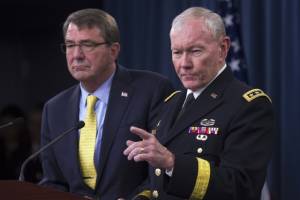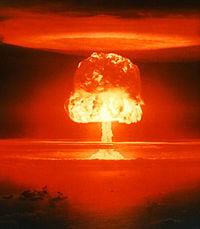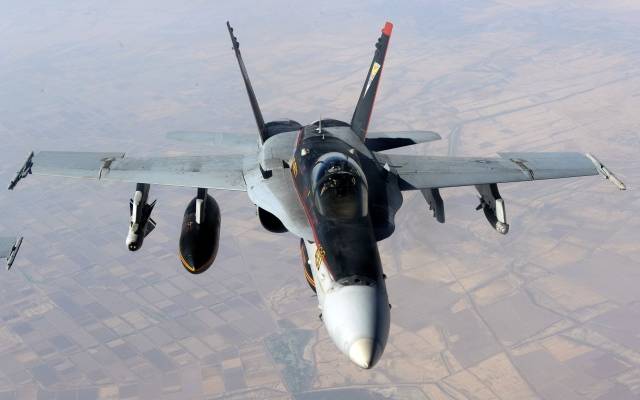
Defense Secretary Ashton Carter (L) and Joint Chiefs Chairman General Martin Dempsey speak during a briefing at the Pentagon. (AP/Cliff Owen)
The US military is reportedly preparing a contingency plan for a strike against Iran if it decides to build a nuclear bomb.
The US Military is stocking up on powerful bunker-buster bombs in anticipation of failure in the nuclear talks between the P5+1 Powers and the Islamic Republic, the LA Times reports.
The immense bunker-busting bombs, which have yet to be used in combat, are America’s most destructive munitions short of atomic weapons. At 15 tons, each is 5 tons heavier than any other bomb in the US arsenal.
The Times quotes US officials as saying that the huge bombs are a crucial element in the White House deterrent strategy and contingency planning should diplomacy go awry and if Iran moves forward in developing a nuclear bomb.
Secretary of Defense Ashton Carter, speaking to reporters Thursday at the Pentagon, downplayed the feasibility of a US strike on Iran, saying that such an attack would not completely eliminate Iran’s nuclear development.
“A military strike of that kind is a setback, but it doesn’t prevent the reconstitution over time,” the Times quotes him as saying. “And that basically has been the case as long as we’ve had those instruments and those plans, and I don’t think there’s anything substantially changed since then.”
However, some Pentagon officials warned not to underestimate US military capabilities even if the bunker-busters cannot eliminate Iran’s nuclear program.
General Martin Dempsey, chairman of the Joint Chiefs of Staff, said that airstrikes might be ordered multiple times if Iran tries to build a bomb.
The military option “isn’t used once and set aside,” he said. “It remains in place…. We will always have military options, and a massive ordnance penetrator is one of them.”
Such a multi-phased attack would include airstrikes by cruise missiles and stealth bombers on Iran’s major nuclear facilities, including the uranium enrichment plant at Natanz, a heavy-water reactor at Arak and a nuclear enrichment site at Fordow, which is inside a mountain and fortified with steel and concrete.
The testing of the massive bombs has been conducted for years, the Times reports, but development ramped up in 2010 after Fordow was uncovered and concern about Iran’s nuclear capabilities rose. Since then, the military has spent at least $400 million — including $40 million this year — to build and upgrade 20 bombs, according to budget documents.
Regional War in Event of Attack on Iran
Analysts cautioned that US strikes on Iranian nuclear facilities would have broad regional ramifications.
“A military strike would result in the worst of all worlds,” Dalia Dassa Kaye, director of the Center for Middle East Public Policy at the nonpartisan Rand Corp, told the Times. “It may eliminate some facilities. But it would not eliminate Iranian scientists’ technical know-how and would likely further incentivize Iran to pursue a weapon at all costs.”
Iran would perhaps back a terrorist attack on the United States, she assessed. US forces battling Islamic State (ISIS) terrorists in Iraq could find themselves targeted by Iranian-backed militias.
A US attack also could spark a broader war in the world’s most volatile region. Iran has thousands of missiles capable of hitting Israel, Jordan and other American allies, according to defense intelligence estimates.
“A dynamic of escalation, action, and counteraction could produce serious unintended consequences that would…lead, potentially, to all-out regional war,” according to a recent study by the Woodrow Wilson International Center for Scholars that was endorsed by 32 high-ranking former military and government officials.
US airstrikes, and the casualties they would cause, almost certainly would spark a harsh response. “It would create huge problems,” Michael E. O’Hanlon, a military analyst at the Brookings Institution, told the Times. “That said, it’s hard to rule out if talks fail.”
By: United with Israel Staff

Sign the Petition to Stop a Nuclear Iran
The US Congress must ensure that sanctions against Iran remain in force until the nuclear threat is completely eliminated.
I strongly oppose easing sanctions before the nuclear threat from Iran has been eliminated. Allowing Iran to enrich uranium without being subject to 'anytime, anywhere' inspections is extremely dangerous and unacceptable. Iran's nuclear program must be stopped.
See our Privacy Policy